
1
Additional Actions Need to Be Taken to Identify and
Address Noncompliant Biofuel Tax Credit Claims
April 24, 2024
Report Number: 2024-300-021
This report has cleared the Treasury Inspector General for Tax Administration disclosure review process and
information determined to be restricted from public release has been redacted from this document.
TIGTACommunications@tigta.treas.gov | www.tigta.gov
TREASURY INSPECTOR GENERAL FOR TAX ADMINISTRATION
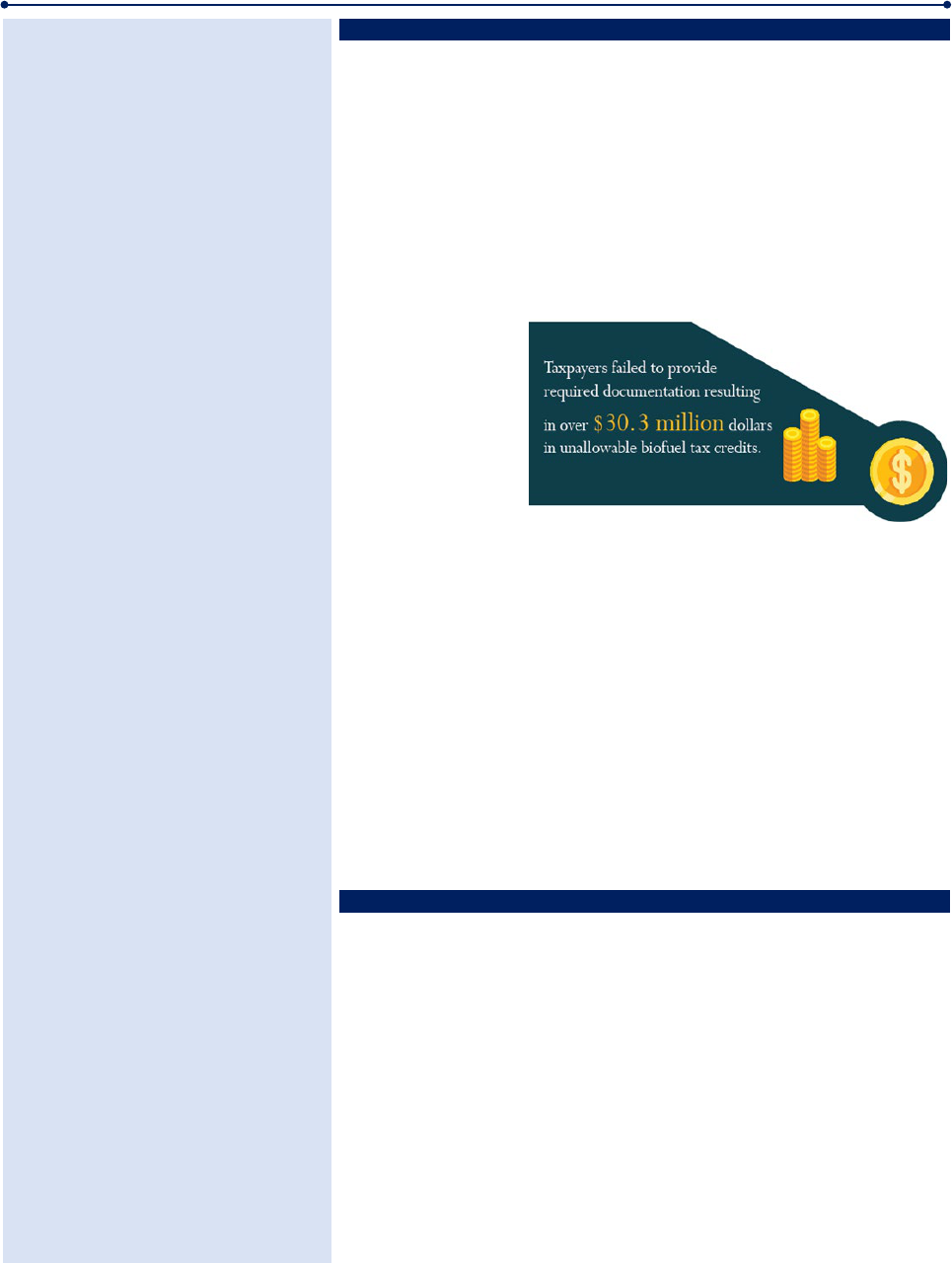
HIGHLIGHTS: Additional Actions Need to Be Taken to Identify
and Address Noncompliant Biofuel Tax Credit Claims
Final Audit Report issued on April 24, 2024 Report Number 2024-300-021
Why TIGTA Did This Audit
Since Congress enacted legislation
creating biofuel tax credits in
Calendar Year 2004, the IRS has
been susceptible to significant
fraudulent schemes that have
resulted in the payment of
erroneous refunds. The most
egregious scheme (one of the
largest fraud schemes in U.S.
history) resulted in over $500
million in erroneous refunds paid
to one entity making fraudulent
claims. With the passage of
additional and expanded clean
energy tax credits in the Inflation
Reduction Act of 2022, there is
even greater incentive to take
advantage of biofuel tax credits
and make fraudulent claims for
biofuel that does not exist or does
not qualify for the biofuel tax
credits. This audit was initiated to
assess the effectiveness of IRS
procedures to detect and prevent
questionable claims for biofuel tax
credits.
Impact on Tax Administration
The Inflation Reduction Act of
2022 extended biofuel tax credits
through December 31, 2024, to
encourage the production of
cleaner energy sources. This
includes tax credits for biodiesel,
renewable diesel, alternative fuels,
and second-generation biofuels.
The Joint Committee on Taxation
estimates that taxpayers will claim
over $5.6 billion of these tax
credits during Fiscal Years 2023
through 2025.
What TIGTA Found
The IRS is not using all of the compliance tools to encourage more
tax compliance of biofuel tax claims. Internal Revenue Code Section
4101 requires applicable taxpayers to register with the IRS before
producing or importing biofuels. Additionally, certain taxpayers
claiming biodiesel-related tax credits are not required to be
registered but must provide a Certificate of Biodiesel from the
producer showing that the biodiesel used to produce the mixture
met the Environmental Protection Agency’s (EPA) biodiesel
specification and registration requirements. TIGTA analysis found
that 42 of 124 taxpayers sampled, that claimed biofuel tax credits
totaling about
$30.3 million, did
not provide either
an approved
registration
number or a
Certificate of
Biodiesel;
therefore, these claims would not be allowable. Under current law,
the IRS could only address these claims after the returns are filed and
examined and it issues notices of deficiency to the taxpayers, as
appropriate. The IRS does not have the legal authority to deny
biofuel tax credits or otherwise enforce the registration requirements
on taxpayers who are not eligible to receive the credits at the time a
tax return is filed.
TIGTA found that the IRS’s compliance efforts are primarily focused
on biofuel tax credit claims made on the Form 8849, Schedule 3,
Certain Fuel Mixtures and the Alternative Fuel Credit
, and Form 720,
Schedule C,
Claims
, and more effective efforts could be undertaken
to evaluate claims made on the Form 4136,
Credit for Federal Tax
Paid on Fuels
.
What TIGTA Recommended
TIGTA recommended that the IRS: 1) engage with the Department of
the Treasury’s Office of Tax Policy to develop a legislative proposal to
ensure taxpayers claiming biofuel tax credits are entitled to the
biofuel credit claims and are properly registered or provide the
required Certificate of Biodiesel with income tax returns; 2) conduct
examinations of the 42 taxpayers we identified to ensure the validity
of the credits claimed; 3) examine more Forms 4136, involving biofuel
tax credit claims; and 4) partner with the EPA to use the agency’s
expertise and data involving taxpayers that claimed biofuel tax
credits.
IRS management agreed with recommendations 1, 3 and 4 and
partially agreed with recommendation 2.

U.S. DEPARTMENT OF THE TREASURY
WASHINGTON, D.C. 20024
TREASURY INSPECTOR GENERAL
FOR TAX ADMINISTRATION
April 24, 2024
MEMORANDUM FOR: COMMISSIONER OF INTERNAL REVENUE
FROM: Matthew A. Weir
Acting Deputy Inspector General for Audit
SUBJECT: Final Audit Report – Additional Actions Need to Be Taken to Identify
and Address Noncompliant Biofuel Tax Credit Claims
(Audit No. 202330023)
This report presents the results of our review to assess the effectiveness of Internal Revenue
Service (IRS) procedures to detect and prevent questionable claims for biofuel tax credits. This
review is part of our Fiscal Year 2024 Annual Audit Plan and addresses the major management
and performance challenge of
Tax Fraud and Improper Payments
.
Management’s complete response to the draft report is included as Appendix VI. If you have
any questions, please contact me or Phyllis Heald London, Acting Assistant Inspector General for
Audit (Compliance and Enforcement Operations).

Additional Actions Need to Be Taken to Identify and Address Noncompliant Biofuel Tax Credit Claims
Table of Contents
Background .....................................................................................................................................Page 1
Results of Review .......................................................................................................................Page 6
Biofuel Tax Credit Claims Were Allowed for Taxpayers That
Were Not Properly Registered or Did Not Provide Proper
Certification Documentation .......................................................................................... Page 6
Recommendation 1: ...................................................................Page 9
Recommendation 2: ...................................................................Page 10
Steps Can Be Taken to More Effectively Identify Noncompliant
Biofuel Tax Credit Claims ..................................................................................................Page 10
Recommendation 3: ...................................................................Page 13
Data Obtained From the Environmental Protection
Agency Could Help Identify Noncompliant Taxpayers and
Fraudulent Schemes ............................................................................................................Page 13
Recommendation 4: ...................................................................Page 18
Appendices
Appendix I – Detailed Objective, Scope, and Methodology ................................Page 19
Appendix II – Outcome Measure ...................................................................................Page 21
Appendix III – Internal Revenue Code Sections Related to the
Biofuel Tax Credit .................................................................................................................Page 23
Appendix IV – Tax Forms Related to the Biofuel Tax Credit ................................Page. 24
Appendix V – Current Examination Initiatives Related to the
Biofuel Tax Credit .................................................................................................................Page 25
Appendix VI – Management’s Response to the Draft Report .............................Page 27
Appendix VII – Glossary of Terms ..................................................................................Page 32
Appendix VIII – Abbreviations .........................................................................................Page. 34

Page 1
Additional Actions Need to Be Taken to Identify and Address Noncompliant Biofuel Tax Credit Claims
Background
History of biofuel tax credits
The Internal Revenue Code (I.R.C.) allows several tax credits for the production, blending, or use
of biofuels.
1
These credits impact a relatively small number of taxpayers compared to other tax
credits. For instance, individuals filed approximately 1.2 million claims for the Fuel Tax Credit on
the Form 1040,
U.S. Individual Income Tax Return
, during Processing Years 2018 through 2021.
2
During a similar period, taxpayers filed a fraction of that amount in biofuel tax credit claims.
The biodiesel tax credit (the most prevalent biofuel credit) was first established with the
American Jobs Creation Act of 2004, and the renewable diesel tax credit was established a year
later with the passage of the Energy Policy Act of 2005.
3
The alternative fuel tax credits were
first established with the passage of the Safe, Accountable, Flexible, Efficient Transportation
Equity Act in 2005.
4
Since then, these fuel tax credits have been extended through legislation
numerous times. Most recently, the Inflation Reduction Act of 2022 (IRA), signed into law on
August 16, 2022, extended these credits through December 31, 2024.
5
The Joint Committee on
Taxation estimates that for Fiscal Years 2023 through 2025, taxpayers will claim $5.6 billion in
these credits.
The second generation biofuel producer credit was first established with the Food Conservation
and Energy Act of 2008.
6
Since then, it has been extended several times, most recently, with the
IRA extending these credits through December 31, 2024.
7
The Joint Committee on Taxation
estimates that for Fiscal Years 2023 through 2025 taxpayers will claim $54 million in these
credits.
1
For purposes of this audit, the term biofuels will encompass biodiesel (one of the most common), renewable diesel,
alternative fuels, and second generation biofuels. See Appendix VI for a glossary of terms.
2
Treasury Inspector General for Tax Administration, Report No. 2023-30-053,
Actions Have Been Taken to Enhance
Fuel Tax Credit Screening and Examination Processes; However, Improvements Are Still Needed
(Sept. 2023).
3
H.R. 4520, P.L. 108-357 and H.R. 6, P.L. 109-58.
4
H.R. 3, P.L. 109-59. See Appendix IV for the various credits and forms.
5
Inflation Reduction Act (IRA), Pub. L. No. 117-169, 136 Stat. 1818
Extension of Incentives for Biodiesel, Renewable
Diesel, and Alternative Fuels
(Section 13201) (2022).
6
H.R. 6124, P.L. 110-246. This tax credit was introduced as the cellulosic biofuel producer credit but was renamed
second generation biofuel with the American Taxpayer Relief Act of 2012, H.R. 8, P.L. 112-240, 126 Stat. 2313.
7
IRA, Pub. L. No. 117-169, 136 Stat. 1818,
Extension of Second Generation Biofuel Incentives
(Section 13202) (2022)
.
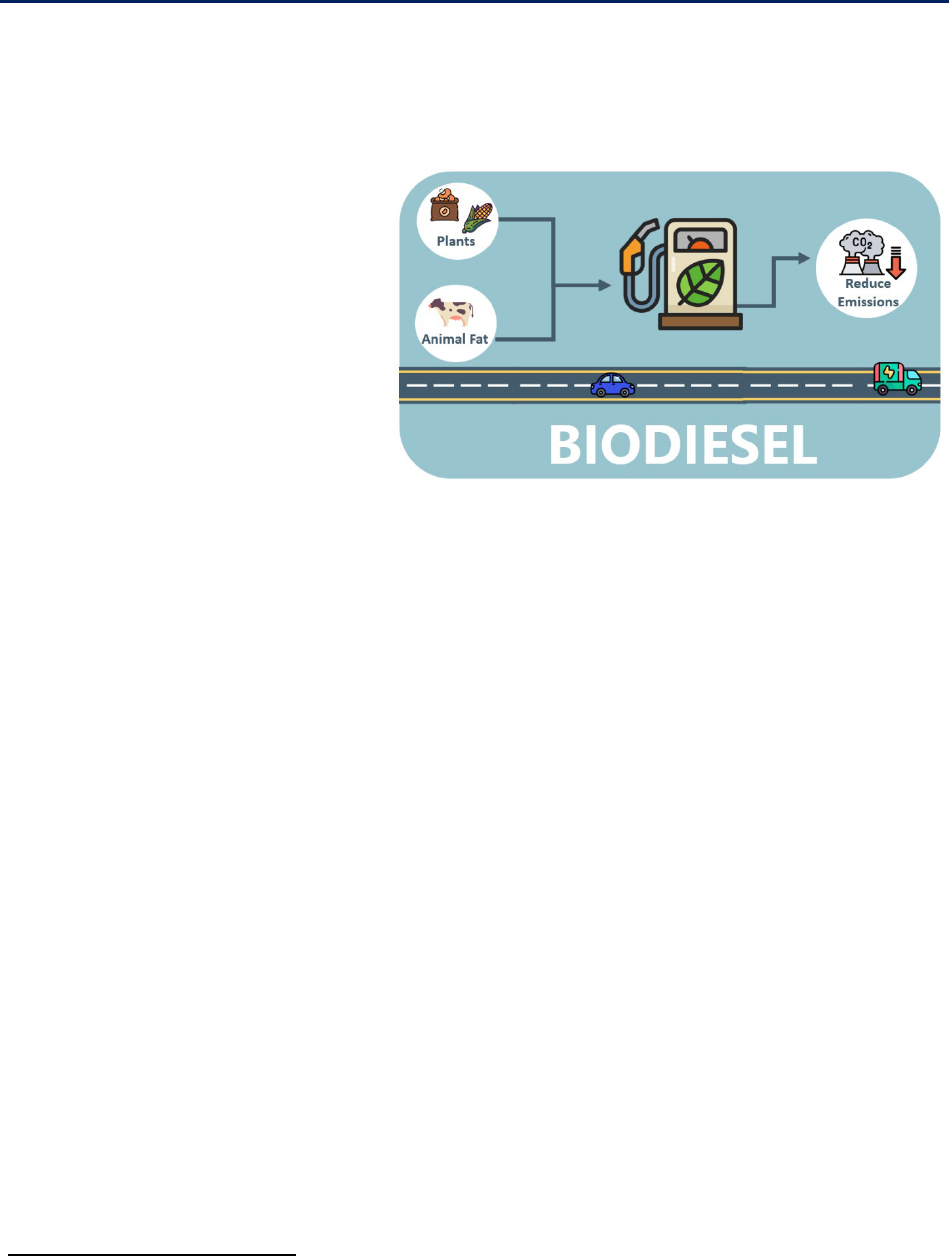
Page 2
Additional Actions Need to Be Taken to Identify and Address Noncompliant Biofuel Tax Credit Claims
Biodiesel and renewable diesel credits
Biodiesel fuel is considered an alternative to petroleum-based transportation fuel. In the United
States, biodiesel is typically made from soybeans and other plant oils, animal fats, and recycled
cooking oils. The use of biodiesel instead of conventional diesel fuel is believed to reduce
particulate matter and hydrocarbon
emissions. Renewable diesel is a fuel
made from fats and oils, such as
soybean oil or canola oil, and is
processed to be chemically the same
as petroleum diesel.
I.R.C. § 6426(a) and (c) allows a
$1.00 per gallon credit against a
taxpayer’s excise tax liability on
taxable fuel under I.R.C. § 4081 for
blended biodiesel, renewable diesel,
and agri-biodiesel. The taxpayers that typically pay excise taxes are those blenders of biodiesel
that purchased the diesel to create the qualifying biodiesel mixtures.
Pursuant to I.R.C. § 6427(e), a payment is allowable to the blender of the mixture to the extent
the tax credits exceed the blender’s excise tax liability under I.R.C. § 4081. Under I.R.C. § 34, the
biodiesel mixture credit described in I.R.C. § 6426 exceeds a person’s I.R.C. § 4081 liability for the
quarter of a tax year, an income tax credit is allowable to the producer of the mixture.
8
I.R.C. § 40A provides a nonrefundable credit for:
• A biodiesel mixture tax credit for the production of a qualified biodiesel mixture sold for
use as a fuel or used as a fuel in the taxpayer’s trade or business.
• A biodiesel tax credit used by the taxpayer in a trade or business or sold by the taxpayer
for fuel in a buyer’s vehicle.
9
The biodiesel tax credit for any tax year is $1.00 for each gallon of biodiesel or qualified
biodiesel mixture.
Alternative fuel credit
Alternative fuels include liquefied petroleum gas, compressed or liquefied natural gas,
compressed or liquefied gas derived from biomass, and liquid fuel derived from biomass.
10
I.R.C. § 6426(d) provides an alternative fuel credit of $0.50 for each gallon of alternative fuel or
gasoline gallon equivalents of a nonliquid alternative fuel sold by the taxpayer for use as a fuel
in a motor vehicle or motorboat. Like biodiesel and agri-biodiesel mixtures, any excess over the
tax liability may be claimed as a payment under I.R.C. § 6427(e) or under I.R.C. § 34.
8
Notice 2020-8,
Biodiesel and Alternative Fuels; Claims for 2018-2019.
9
I.R.C. § 40A(b)(1) and I.R.C. § 40A(b)(2).
10
The IRA removed liquefied hydrogen from the definition of alternative fuel under I.R.C. § 6426(d)(2) for the
purposes of the alternative fuel credit and alternative fuel mixture credit for fuel sold or used after
December 31, 2022.

Page 3
Additional Actions Need to Be Taken to Identify and Address Noncompliant Biofuel Tax Credit Claims
Tax forms used to claim biodiesel and alternative fuel credits
There are several different tax forms that may be used to claim the diesel-related and alternative
fuel tax credits:
1. Form 720,
Quarterly Federal Excise Tax Return
, must be filed if the taxpayer claiming the
tax credit is liable for fuel excise taxes. The blender of the biodiesel is liable for the
excise tax upon sale or removal of blended taxable fuel or the alternative fuel mixture.
The person that sells or uses alternative fuel in a motor vehicle or motorboat is liable for
excise tax on the sale or use of the alternative fuel.
2. Form 720, Schedule C,
Claims
, is filed by the taxpayer to offset any alternative fuel credit,
alternative fuel mixture credit, biodiesel or renewable diesel mixture credit, or sustainable
aviation fuel credit against taxable liabilities reported on Form 720. The Form 720,
Schedule C, cannot be used to claim tax credits unless the buyer has an excise tax
liability.
3. Form 8849,
Claim for Refund of Excise Taxes
,
Schedule 3,
Certain Fuel Mixtures and the
Alternative Fuel Credit
, is submitted by the taxpayer to request a refund for any credits in
excess of the excise taxes paid. These claims can be filed quarterly or even weekly
during the tax year. The excess can also be claimed on Form 720, Schedule C.
4. Form 4136,
Credit for Federal Tax Paid on Fuels
,
is used to claim biodiesel, renewable
diesel, and alternative fuel credits as refundable income tax credits on the taxpayer’s
Federal income tax return when any amount of biodiesel, renewable diesel, or alternative
fuel have not been claimed on the Form 8849, Schedule 3, or Form 720, Schedule C.
In addition, the taxpayer can use Form 8864,
Biodiesel and Renewable Diesel, or Sustainable
Aviation Fuels Credit
, to offset income tax liability, but the credit is otherwise nonrefundable.
The credits claimed on Form 8864 are recorded on the Form 3800,
General Business Credit
.
Form 3800 is used to summarize all the various business credits and to calculate the total
General Business Credit amount allowed in the current tax year. The amount is also reported on
the main income tax form such as the Form 1040 or Form 1120,
U.S. Corporation Income Tax
Return
, to offset tax liability.
Only one credit may be claimed for any one gallon of biodiesel or renewable diesel. If any
amount is claimed (or will be claimed) of biodiesel or renewable diesel on Form 720, Schedule C;
Form 8849, Schedule 3; or Form 4136, a claim cannot be made on Form 8864 for that amount of
biodiesel or renewable diesel. Figure 1 illustrates the process of paying excise taxes and
claiming the credits for the excise taxes paid, including claiming refundable excise tax credits.
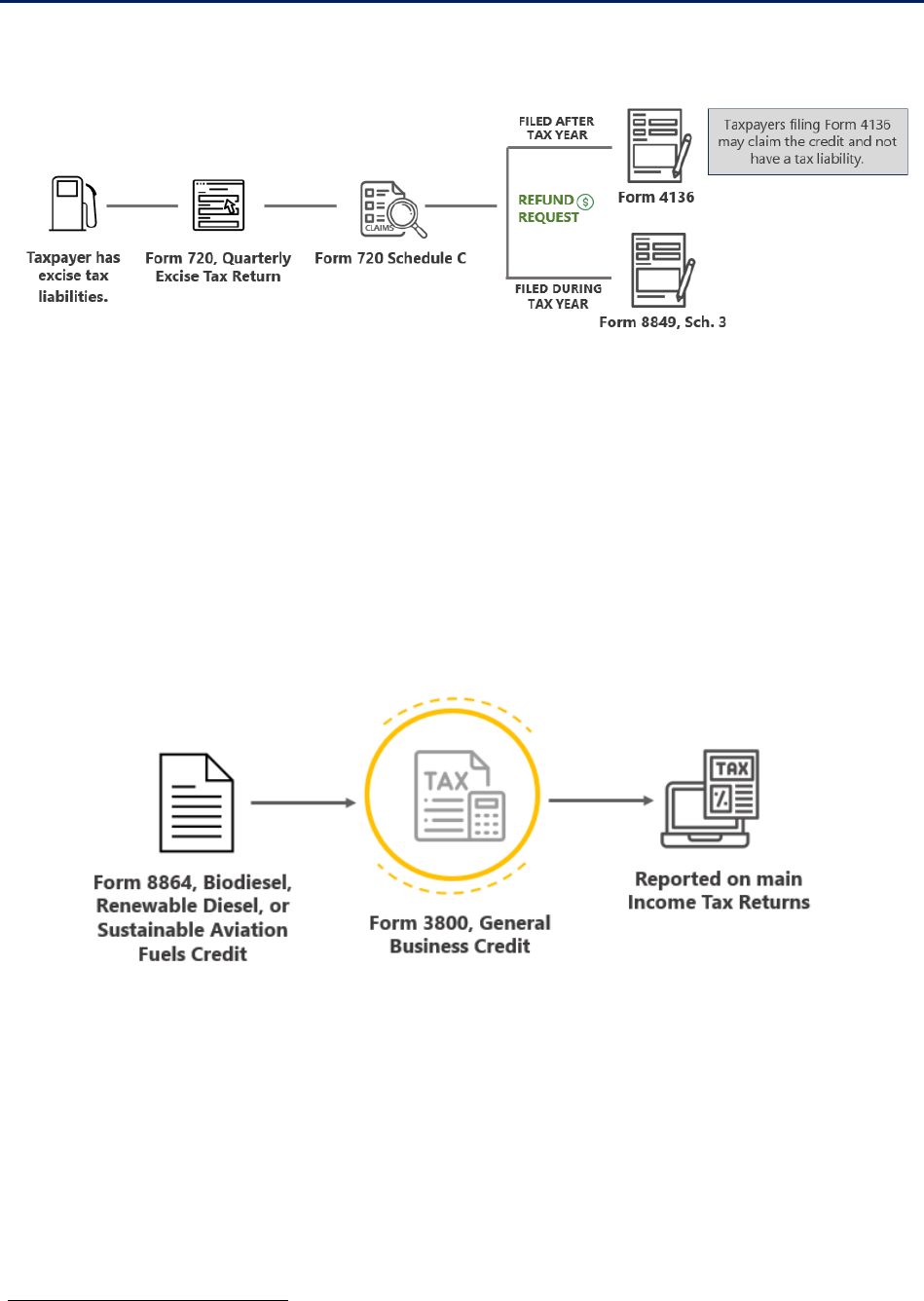
Page 4
Additional Actions Need to Be Taken to Identify and Address Noncompliant Biofuel Tax Credit Claims
Figure 1: The Process for Taxpayers to Claim Excise Tax Credits
Source: Treasury Inspector General for Tax Administration (TIGTA) created graphic.
While these credits can be used only to offset tax liability and are not otherwise refundable,
taxpayers can carry any unused General Business Credit back or forward on subsequently filed
returns. A TIGTA audit found that only about 23 percent of the total amount claimed by
business taxpayers on the Form 3800 was used to offset tax. The remaining unused credits were
available to carryback or carryforward.
11
Figure 2 illustrates the process for claiming the
nonrefundable biodiesel credit.
Figure 2: The Process for Claiming the Nonrefundable Biodiesel Income Tax Credit
Source: TIGTA-created graphic.
Second generation biofuel producer credit (or otherwise termed Cellulosic)
Second generation biofuel is produced from feedstocks such as wood crops, grass, or
non-edible parts of plants. As with biodiesel and renewable diesel production, second
generation biofuel is produced through specialized processes. The tax credit for production of
11
TIGTA, Report No. 2015-40-012,
Processes Do Not Ensure That Corporations Accurately Claim Carryforward General
Business Credits
(Feb. 2015).

Page 5
Additional Actions Need to Be Taken to Identify and Address Noncompliant Biofuel Tax Credit Claims
second generation biofuels allows qualified taxpayers a $1.01 per gallon tax credit.
12
The
taxpayers that claim this credit are the producers of second generation biofuels.
This nonrefundable tax credit is calculated and claimed on Form 6478,
Biofuel Producer Credit
.
Like the biodiesel tax credits, these calculated tax credits are then recorded on the Form 3800.
As stated previously, the Form 3800 is used to summarize all the various business credits and to
calculate the total General Business Credit amount allowed in the current tax year. The amount
used for the current year by the taxpayer to offset taxes owed is then reported on the parent
income tax form such as the Form 1040 or Form 1120. The amount used is generally limited to
the amount of tax owed. Taxpayers can carry any unused General Business Credit back or
forward on subsequent filed income tax returns. Figure 3 illustrates the process for claiming the
credit.
Figure 3: The Process for Claiming the Nonrefundable
Second Generation Biofuel Producer Credit
Source: TIGTA-created graphic.
Most biofuel tax credits are claimed on Form 8849, Schedule 3
To gain perspective on the number and amounts of biofuel tax credit claims, we requested
statistical information from the Internal Revenue Service (IRS) on the number claimed in recent
years, and the IRS referred us to Statistics of Income Division data. However, the Statistics of
Income data did not contain Form 8849, Schedule 3, data. We therefore relied on data from the
Modernized Tax Return Database to identify biofuel tax credit claims made during Processing
Years 2020 through 2023 (Tax Years 2019 through 2022) on the Form 8849, Schedule 3; Form
4136; Form 8864; and Form 6478. However, this only provided us with information from tax
returns that were filed electronically.
Our analysis of data from the Modernized Tax Return Database found that the highest biofuel
tax credit claims are made using the Form 8849, Schedule 3.
13
Specifically, from Tax Years 2019
through 2022 almost 1,500 claims were made for over $3.5 billion using the Form 8849,
12
I.R.C. § 40(a)(4) and (b)(6).
13
The numbers in this paragraph are approximations from our analysis.

Page 6
Additional Actions Need to Be Taken to Identify and Address Noncompliant Biofuel Tax Credit Claims
Schedule 3. Over the same period, more than 16,000 claims totaling over $600 million were
made on the Form 4136. Almost 12,000 claims were made for about $100 million on the
Form 8864 and just over 2,000 claims for about $33 million were made on the Form 6478.
The most prevalent refundable biofuel tax credits claimed on the Form 8849, Schedule 3, and
Form 4136 include agri-biodiesel mixtures, biodiesel mixtures, and renewable diesel mixtures.
Among the alternative fuel credits claimed, the liquefied petroleum gas and compressed natural
gas were claimed the most.
14
IRS biofuel tax credit responsibilities
The IRS is responsible for the administration of biofuel tax credits. While these credits might be
questioned by any revenue agent during an examination, overall responsibility for the Federal
Fuel Tax Program areas falls under the Excise Tax Program of the Small Business/Self-Employed
(SB/SE) Division. The SB/SE Division Excise Tax Program is the responsibility of the Specialty
Examination Director. This program is responsible for conducting a wide variety of fuel-related
examinations, inspections, and compliance reviews for the taxes related to biofuels.
The SB/SE Division, Excise Tax Policy, is responsible for the administration, procedures, and
updates related to the Fuel Tax Program. The SB/SE Division Excise Case Selection (ECS)
function is responsible for following policy guidance on the selection of cases and delivery of
inventory for examination, and SB/SE Division Specialty Examination – Field is responsible for
conducting those examinations. Criminal Investigation (CI) is responsible for conducting
criminal investigations involving fraudulent biofuel tax credit claims.
Results of Review
Biofuel Tax Credit Claims Were Allowed for Taxpayers That Were Not Properly
Registered or Did Not Provide Proper Certification Documentation
Our review found that the IRS does not address improper biofuel tax credit claims during filing
because it lacks legal authority to do so and can only address these claims during examinations.
I.R.C. § 4101 and Treasury Regulation § 48.4101-1 require taxpayers to register with the IRS
before engaging in certain excise tax activities, and in other situations, a taxpayer must be
registered in order to file a claim for refund or credit. These activities include producing or
importing biodiesel and renewable diesel, producing second generation biofuels, and creating a
blended taxable fuel.
According to the SB/SE Division, Specialty Examination Policy, claimants of the biodiesel and
renewable diesel tax credits are not required to be registered under I.R.C. § 4101. However,
claimants must provide a certificate from the importer or producer showing that the biodiesel or
renewable diesel used to produce the mixture met the registration requirements. Taxpayers
14
IRS management opined that our calculations of biofuel tax credit claims may be understated because we
only analyzed claims made on electronically filed tax returns and most biofuel tax credit claims made on the
Form 8849, Schedule 3, are made using paper returns. However, IRS management was unable to provide data
on the total amount of Form 8849, Schedule 3, biofuel tax credit claims made in recent years.

Page 7
Additional Actions Need to Be Taken to Identify and Address Noncompliant Biofuel Tax Credit Claims
apply for registration by filing Form 637,
Application for Registration (For Certain Excise Tax
Activities)
, with the IRS. The SB/SE Division indicated that claims for biodiesel or renewable
diesel should not be paid unless the original importer or producer had an approved Form 637.
In the case of second generation biofuel, the producer must be registered. Figure 4 provides
the registration and certification documentation requirements for those taxpayers claiming
biofuel tax credits.
Figure 4: Biofuel Tax Credit Registration and Certification Requirements
Type of Tax
Credit Claim
Requirements
Alternative Fuel Credit
The alternative fueler (of unmixed fuel) must be registered with a Form
637 registration in order to file a claim for the alternative fuel credit.
Biodiesel and Renewable
Diesel Mixture Credit
Producers and importers of agri-biodiesel must be registered with a Form
637 registration.
Producers and importers of biodiesel (other than agri-biodiesel) are
required to be registered with a Form 637 registration.
Producers and importers of renewable diesel must be registered with a
Form 637 registration.
Blenders are required to be registered with a Form 637 registration if the
blender produces a blended taxable fuel outside the bulk
transfer/terminal system.
A certificate from the producer/importer is
required to be included with the claim for the tax credit.
Second Generation Biofuel
Tax Credit
Producers of second generation biofuel are required to register with Form
637 registration.
Registration is required to file a claim for the second generation biofuel
tax credit.
Source: SB/SE Division, Excise Revenue Agent Basic Recruit Training – Phase 2.
We selected a judgmental sample of 124 taxpayers that claimed biofuel tax credits during
Processing Year 2022 to determine if they were properly registered or if they provided the
Certificate of Biodiesel indicating that the producer of the biodiesel is registered with the IRS.
15
This included 75 business taxpayers that claimed the biodiesel or renewable diesel mixture
credits on the Form 8849, Schedule 3; Form 4136; and Form 8864, 24 business taxpayers that
claimed alternative fuel credits on the Form 4136, and 25 business taxpayers that claimed
second generation biofuel tax credits on the Form 6478.
For the 124 sample cases, we reviewed the IRS Integrated Data Retrieval System (IDRS) data and
tax return information. We found that all 25 taxpayers that made claims for biodiesel or
renewable diesel mixture credits on the Form 8849, Schedule 3, were either properly registered
with the IRS or provided the Certificate of Biodiesel. However, we found that most of the
remaining taxpayers either did not provide a valid registration number or did not provide the
Certificate of Biodiesel. Specifically, we found that taxpayers did not provide the following:
• A Certificate of Biodiesel for 10 of the 25 claims for refundable biodiesel or renewable
diesel mixture credits totaling almost $1 million made on the Form 4136. We provided
15
A judgmental sample is a nonprobability sample, the results of which cannot be used to project to the population.

Page 8
Additional Actions Need to Be Taken to Identify and Address Noncompliant Biofuel Tax Credit Claims
three of the 10 claims to the SB/SE Division for review. It responded that the claimants
should have attached the Certificate of Biodiesel from the producer showing that the
biodiesel used to produce the mixture met the Environmental Protection Agency’s (EPA)
registration requirements for fuels and fuel additives. Without the Certificate of
Biodiesel, these claims are not allowable.
• The required valid registration for 13 of the 24 claims for refundable alternative fuel
credits totaling more than $25 million made on the Form 4136.
• A Certificate of Biodiesel for 19 of the 25 claims for nonrefundable biodiesel or
renewable diesel mixture credits totaling more than $3.6 million made on the Form 8864.
****************************************1***************************************************
****************************************1****************************************************
*****************************************1***************************************************
*****************************************1***********************************.
16
******1******
*****************************************1**************
• T
he required valid registration for 22 of the 25 claims for nonrefundable second
generation biofuel credits totaling almost $1.3 million made on the Form 6478. *1*
*******************************************1********************************************
*******************************************1*****************************************
********************************************1*******************************************
********************************************1*******************************************
********************************************1*******************************************
*****1*****************. All 22 cases were flow-throughs from either partnerships,
S corporations, cooperatives, estates, or trusts claimed on Line 3 of the form.
Figure 5 shows the samples selected and the results of our testing to determine if taxpayers
were properly registered or provided a valid Certificate of Biodiesel.
16
ASTM D6751 is the U.S. specification that defines biodiesel as mono-alkyl esters of long chain fatty acids derived
from vegetable oils and animal fats.

Page 9
Additional Actions Need to Be Taken to Identify and Address Noncompliant Biofuel Tax Credit Claims
Figure 5: Biofuel Tax Credit Registration and Certification Testing
Tax
Form
Type of Credits
Tested
Sample
Tested
Sample
Amount of
Biofuel Tax
Credits
Claimed
No Proper
Registration
or
Certification
Provided
Claims
Amount of
Erroneous Biofuel
Tax Credits
Claimed
8849,
Sch. 3
Biodiesel or
Renewable Diesel
Mixture Credits
25 $180,071,190 0 $0
4136
Biodiesel or
Renewable Diesel
Mixture Credits
25 $11,520,489 10 $908,126
4136
Alternative Fuel
Credits
24 $44,134,575 13 $25,750,247
8864
Biodiesel or
Renewable Diesel
Mixture Credits
25 $8,251,942 19 $3,611,883
6478
Second Generation
Biofuel Credit
25 $8,645,919 0 $0
Totals
124
$252,624,115
42
$30,270,256
Source: TIGTA analysis of the Modernized Tax Return Database, the IDRS, and the Employee User
Portal.
We discussed with the Wage and Investment Division, Submission Processing, conducting
compliance checks when the tax returns are received and processed to ensure that applicable
taxpayers are properly registered, are attaching the required certificates, and that any attached
certificates contain a valid registration number. These checks could have prevented the IRS
from allowing the 42 biofuel tax credit claims totaling $30,270,256 that were made on the Forms
4136 and 8864.
However, IRS management stated that the IRS cannot deny biofuel tax credits when income tax
returns are filed without an examination subject to deficiency procedures.
17
IRS management
stated they are unable to use so-called “math error authority” to deny biofuel tax credits even
though the taxpayers may have failed to obtain the certifications and registrations required by
law.
18
The IRS’s math error authority is limited to specific categories of mathematical or clerical
errors, and while the omission of information from a form or schedule can constitute a math
error under the law, it is the IRS’s position that the law must require the inclusion of that
information on a taxpayer’s return for math error authority to be applicable. Accordingly, the
ability to address these claims when they are filed would require a change to the biofuel tax
credit provision discussed in this report to require that registration and certification be
evidenced on the tax return. Under current law, the IRS could only address these claims after
the returns are filed and examined and it issues notices of deficiency to the taxpayers, as
appropriate. The IRS would need to engage with the Department of the Treasury’s Office of Tax
17
I.R.C. §§ 6211 through 6215.
18
I.R.C. § 6213(g)(2)(D) defines math error authority to include “an omission of information which is required to be
supplied on the return to substantiate an entry on the return.” However, IRS management states that the certification
and registration information referenced in this report is not currently required to be provided on the tax return.

Page 10
Additional Actions Need to Be Taken to Identify and Address Noncompliant Biofuel Tax Credit Claims
Policy to proceed with a legislative proposal to obtain the legal authority to ensure that
taxpayers meet the requirements.
Recommendation 1: The Commissioner, Wage and Investment Division, should engage with
the Department of the Treasury’s Office of Tax Policy to develop a legislative proposal to require
that taxpayers claiming biofuel tax credits provide information that they are properly registered
(if applicable) or that they provided the required Certificate of Biodiesel when income tax returns
are filed.
Management’s Response: IRS management agreed with this recommendation and will
share this report with the Department of the Treasury’s Office of Tax Policy, explain the
current law and compliance constraints during filing, and support the Department of the
Treasury if it determines to proceed with a legislative proposal to address this issue.
Recommendation 2: The Commissioner, SB/SE Division, should establish a Compliance
Initiative Project to conduct examinations of the 42 taxpayers reported in Figure 5 to ensure the
validity of the biofuel tax credits that were claimed and that these taxpayers are properly
registered and have the required certificates (that contain a valid registration number).
Management’s Response: IRS management partially agreed with this recommendation
stating it will review the 42 tax returns identified by TIGTA and determine if compliance
activity is warranted.
Office of Audit Comment: We disagree with IRS management’s proposed
alternate corrective action. We believe that compliance activity is warranted
given these 42 taxpayers were allowed over $30 million in biofuel tax credits
while not providing a valid registration number or not providing the Certificate of
Biodiesel. Compliance Initiative Projects involve contact with specific taxpayers to
identify potential areas of noncompliance for the purpose of correcting the
noncompliance. For these 42 cases, the Compliance Initiative Project approach is
ideal in that the results of the examinations will be closely tracked with project
codes and provide IRS management with additional support in discussions with
the Department of the Treasury’s Office of Tax Policy (recommendation 1).
Steps Can Be Taken to More Effectively Identify Noncompliant Biofuel Tax
Credit Claims
The IRS’s compliance efforts are primarily focused on excise tax-related biofuel tax credit claims
made on the Form 8849, Schedule 3, and the Form 720, Schedule C.
19
All Form 8849, Schedule
3, biofuel tax credit claims are received and processed by its Centralized Specialty Tax
Operations at the Cincinnati Campus. Claims exceeding a certain dollar threshold are classified
by a revenue agent, and all remaining claims are screened by a tax specialist to determine if the
claim is allowable or should be referred for examination. If large, unusual, or questionable
19
Specifically, the biofuel tax credit claims are made on the Form 8849, Schedule 3.

Page 11
Additional Actions Need to Be Taken to Identify and Address Noncompliant Biofuel Tax Credit Claims
issues are identified during processing of the unpaid claims, they are referred to Field
Examination.
20
SB/SE Division management stated that after the refund has been issued, all claims made on the
Form 8849, Schedule 3, and the Form 720, Schedule C, are screened for examination using filters
designed by various examination initiatives to identify claims that require further review. The
SB/SE Division reviews the claims for certain attributes or indicators and will consider sending
them to the field for examination if the claims contain some of these attributes,
e.g.
, if the
taxpayer making the claim did not file a related income tax return.
The Form 720, Schedule C, is received and processed by the Wage and Investment Division’s
Submission Processing function at the Ogden Campus. A tax compliance officer reviews the
forms to determine if the claim is allowable or if additional review is required. If further
scrutinization is warranted, the forms are referred and reviewed by a revenue agent in the Excise
Tax function. If large, unusual, or questionable issues exist, they are referred to Field
Examination.
The SB/SE Division has 14 ongoing examination initiatives related to biofuel tax credit claims.
These initiatives tend to be related to excise tax claims and focus on those claims made on the
Form 8849, Schedule 3, and the Form 720, Schedule C. Only one of these initiatives appears to
address biofuel-related claims made by businesses on the Form 4136, and none appear to
address those nonrefundable credit claims made on the Forms 8864 or 6478. Appendix V
contains a more detailed description of each initiative along with initiation dates and tracking
codes.
Some of the initiatives dedicated solely to biofuel tax credits tend to have relatively high
no-change rates. This may indicate that the taxpayers claiming these credits are largely
compliant or that the methods to identify or conduct these examinations can be improved. The
IRS’s primary objective in selecting returns for examination is to promote the highest degree of
voluntary compliance on the part of taxpayers while making the most efficient use of finite
examination staffing and other resources.
21
Having a higher no-change rate for examinations
means that more compliant taxpayers are being subject to examinations and noncompliant
taxpayers are not being identified, thereby negatively impacting taxpayer compliance. For some
of these examination initiatives, it may be too early to form conclusions about the no-change
rates.
The SB/SE Division recently started two of the initiatives. One is designed to compare biofuel
claims to the data received from the EPA Renewable Identification Numbers (RIN) data. The
other is designed to analyze biodiesel mixture and renewable diesel mixture claims made on the
Form 720, Schedule C, and the Form 8849, Schedule 3, using various filters. The SB/SE Division
has completed only a small number of examinations for these initiatives, if any, and it is too
soon to evaluate their effectiveness. Figure 6 lists the 14 ongoing SB/SE Division examination
20
On February 21, 2020, the Director, SB/SE Division, Examination, Specialty Policy, issued a memorandum to the
Director, Examination, Cincinnati Campus, providing guidance regarding criteria for the disallowance, examination
selection, and payment of biofuel tax credit claims that were retroactively reinstated for Tax Years 2018 and 2019 as
part of the budget agreement.
21
Internal Revenue Manual, 4.1.26.2.2(1),
SB/SE Campus Examination Guidance for Fairness in Case Selection
(Aug. 29, 2017).

Page 12
Additional Actions Need to Be Taken to Identify and Address Noncompliant Biofuel Tax Credit Claims
initiatives along with the no-change percentages for the number of examinations closed during
Fiscal Years 2018 through 2023 (as of March 31, 2023).
Figure 6: Ongoing Examination Initiatives Related to Biofuel Tax
Credits and No-Change Rates for Closed Examinations
Title of Initiative
Biofuel
Specific
Number
Closed
22
No-Change
Percentage
23
Total
Adjustment
Amount
Adjustments
Per Hour
24
Biofuel Claims for Credit Reference
Numbers 307, 388, and 390
X 0
Not
Applicable
$0
Not
Applicable
Biodiesel Blenders Below the Rack X 44 77 $83,165 $78
Workload Return System 2,803 63 $70,691,222 $929
Form 637, M Registrant Nonfilers 60 78 $19,723 $13
Nontaxable Use Claims for Alternative
Fuels
X 13 38 $28,859 $385
Alternative Fuel Mixture Credits for
Butane and Gasoline Blends
25
X 52 89 ($472,609) ($1,136)
Alternative Fuels and Alternative
Fuels Mixture Credits
X 130 55 $1,981,136 $519
Propane and Butane Mixture
Claims
26
X 12 42 ($79,757,718) ($839,555)
Tax Year 2018 Form 1040 Excise
Referral Returns Compliance
Initiative Project
471 1 $16,708,359 $3,254
Volume Comparison 720TO vs. 720
27
203 48 $16,132,470 $3,043
Biodiesel Blenders Below the Rack -
Claims
X 35 77 $68,208 $67
Biofuel Claims vs EPA RIN Data X 3 33 $2,691 $14
2018 – 2019 Retroactive Biofuel
Credits
X 307 51 $59,818,724 $3,997
Fuel Summit Project 100 76 $122,485 $34
Source: TIGTA analysis of Data Center Warehouse Audit Information Management System data. The
initiative title was provided by the SB/SE Division.
22
Total number of tax returns examined and closed. A taxpayer may have more than one tax return examined.
23
When an examination results in no adjustment, it will be disposed of as no-change and closed.
24
The total adjustments made on the tax returns examined divided by the total time spent by examiners on all tax
returns examined.
25
Per the SB/SE Division, alternative fuel mixture credits for the butane and gasoline blends initiative are unpaid claim
examinations. A no-change on an unpaid claim examination reflects that the claim was disallowed in full; therefore,
this would be revenue protection. The negative adjustment amounts in these columns show the amount of
disallowed unpaid claims, revenue protected, and not a no-change examination as traditionally viewed.
26
Per the SB/SE Division, the propane and butane mixture claims are unpaid claim examinations. See the prior
footnote for an explanation of a no-change on an unpaid claim examination.
27
Form 720-TO,
Terminal Operator Report
.

Page 13
Additional Actions Need to Be Taken to Identify and Address Noncompliant Biofuel Tax Credit Claims
ECS personnel stated that adding additional reporting requirements for taxpayers making
biodiesel and renewable diesel mixtures, alternative fuel, and alternative fuel mixture tax credit
claims could help the IRS identify noncompliance. Additional reporting requirements that would
helpful include: a list of sales to include the customer’s name, Employer Identification Number,
and summary of gallons sold to each customer. Taxpayers could enter that information into the
Excise Summary Terminal Activity Reporting System, commonly referred to as ExSTARS.
28
SB/SE
Division Excise Tax Policy indicated that this would require a legislative change to classify
biodiesel as a taxable fuel and has been pursuing that change but has thus far been
unsuccessful.
Recommendation 3: The Commissioner, SB/SE Division, should evaluate if there are
opportunities to include biofuel tax credit claims made on the Form 4136 into ongoing
examination initiatives involving biofuel.
Management’s Response: IRS management agreed with this recommendation and will
evaluate its biofuel initiatives and determine if Form 4136 data will add value to case
selection.
Data Obtained From the Environmental Protection Agency Could Help Identify
Noncompliant Taxpayers and Fraudulent Schemes
Congress adopted the Renewable Fuel Standard (RFS) program to reduce the Nation’s
dependence on foreign oil, help grow the U.S. renewable energy industry, and achieve
significant greenhouse emissions reductions. The EPA is responsible for implementing the RFS
program and enforcing its requirements. The RFS program requires a certain amount of
renewable fuel to replace or reduce the quantity of petroleum-based transportation fuel,
heating oil, or jet fuel. Congress set targets for the total amount of renewable fuel to replace
petroleum-based fuels each year through Calendar Year 2022. The EPA translates these targets
into individual compliance obligations that each blender or importer must meet every year.
These blenders and importers generate RINs to meet their renewable fuel obligations.
29
RINs are self-generated by producers of a renewable fuel pursuant to EPA guidelines and
registered in the EPA’s Moderated Transaction System. To be eligible to generate RINs, the
producers of renewable fuel must register and receive approval from the EPA and show annual
compliance and obey mandated recordkeeping requirements. The RIN code structure makes it
possible to tie a RIN to both a specific company and a specific facility. This information is part of
the EPA’s Moderated Transaction System in which the business activities at each facility location
are also tracked. Each batch of fuel produced each year has a unique batch number.
30
The
number of RINs generated can be voluminous. For instance, during Calendar Year 2021 alone,
nearly 20 billion RINs were generated.
31
28
This system requires a monthly information document from fuel terminal operators and carriers detailing the
receipts and disbursements of liquid products passing through a taxable fuel storage and distribution facility.
29
U.S. EPA, Office of Inspector General, Report No. 23-P-0032,
The EPA Must Improve Controls and Integrate Its
Information System to Manage Fraud Potential in the Renewable Fuel Standard Program
(Sept. 2023).
30
The International Council on Clean Transportation
, A Conversational Guide to…Renewable Identification Numbers
(RINs) in the U.S. Renewable Fuel Standard
(May 2014).
31
EPA: 19.86 billion RINs generated under the RFS in 2021
, https://biomassmagazine.com, January 21, 2022.

Page 14
Additional Actions Need to Be Taken to Identify and Address Noncompliant Biofuel Tax Credit Claims
The EPA pursues enforcement actions (both civil and criminal) against renewable fuel producers
and importers that generated invalid RINs to protect the program’s integrity and maintain a
level playing field for regulated companies. The fraudulent generation of RINs for fuel that was
not produced can be used to claim fraudulent biofuel tax credits from the IRS.
In July 2019, the IRS signed a Memorandum of Understanding (MOU) with the EPA to share
information about fuel production facilities and fuel program compliance. The purpose of the
MOU was to facilitate policy development, market understanding, verify data for renewable fuel
credits, identify and reduce RIN fraud in support of RFS program administration, and identify
and reduce fuel tax credit fraud in support of Federal tax administration.
32
According to the
MOU, there is a residual compliance effect that occurs when entities considering dishonest or
illegal practices realize the IRS is involved with joint enforcement efforts with the EPA. In
addition, the IRS can make requests for information on a case-by-case basis.
During Fiscal Year 2021, the SB/SE Division obtained data files which included aggregate RIN
data such as buy and sell transaction data. The SB/SE
Division’s Excise Tax Program personnel analyzed this data by
comparing biodiesel tax credit claims made on the Form 8849,
Schedule 3, and identified companies that claimed biofuel tax
credits that may not have been justified based on taxpayer
behavior in the industry. The resulting SB/SE Division internal
report concluded that some entities filed claims on the Form
8849, Schedule 3, that did not have any corresponding RIN
data, which may be indicative of noncompliance with the tax
laws.
33
The internal IRS report also indicated that the analysis found
the data to be complex and transactionally rich and could be
useful in identifying noncompliance. The report recommended
that the SB/SE Division conduct examinations on those entities
that had Form 8849, Schedule 3, claims but did not have any
related activity transaction data according to EPA information.
The SB/SE Division began an initiative during Calendar
Year 2022 to conduct examinations with this information to
identify noncompliance with credits and payments allowable
for biodiesel mixtures and renewable diesel mixtures. The IRS
assigned tracking codes to monitor the results, but it does not
have a planned number of examinations and explained that
plans are not built for specific tracking codes. ECS personnel stated there are significant
challenges to comparing EPA RIN data to biofuel tax credits claimed to identify noncompliance,
including:
• Buying and selling RINs like a commodity without the biofuel ever changing hands.
32
Memorandum of Understanding Between the Internal Revenue Service and the United States Environmental
Protection Agency
, July 30, 2019.
33
Environmental Protection Agency and IRS Data Analysis to Identify Potentially Inflated Form 8849 Claims.
Joint
Operations Center, Excise Tax, Internal Revenue Service, December 16, 2021.

Page 15
Additional Actions Need to Be Taken to Identify and Address Noncompliant Biofuel Tax Credit Claims
• Being eligible to claim the tax credit but not processing the RIN. For example, a RIN is
created when the pure biodiesel is created by a producer and a third party blends the
pure biodiesel with diesel to create a new blend. The third-party blender would be
eligible for the tax credit.
Since the initiative began, only three examinations have been conducted and *********1******
***************************************************1***********************************************
****************************1*************************
Significant fraudulent schemes targeting biofuel tax credits have resulted in the
payment of erroneous refunds
This audit was initiated due to concerns of fraud raised to TIGTA regarding the IRS’s efforts to
ensure the compliance of those taxpayers claiming biofuel tax credits. In March 2023, the IRS
included fuel tax credit scams on its annual list of “Dirty Dozen” tax scams warning taxpayers to
watch out for promotors pushing improper fuel tax credit claims that taxpayers are not qualified
to receive.
34
There have also been a number of high-profile fraudulent schemes involving biofuel tax credits
in which the IRS did not disallow the fraudulent claims until after millions in erroneous refunds
were paid.
35
For instance, in one scheme, individuals from multiple companies conspired to
claim and receive over $15 million in fraudulent biofuel tax credits from 2010 through 2014. The
conspirators fraudulently generated RINs but did not produce renewable fuel in accordance with
specifications. Most of the biofuel claimed was either never produced or was reprocessed.
36
In another scheme, a taxpayer received over $7 million in fraudulent biofuel tax credits claimed
on the Form 8849, Schedule 3, and the Form 4136 with some claims being made after the
company was evicted from the facility and for renewable fuel that was never produced. There
was also no indication from our review of the court documents that the RINs had been falsely
generated. In addition, the taxpayer did not file corporate tax returns during the period of the
fraudulent claims.
37
SB/SE Division personnel indicated that they now include the nonfiling of
tax returns as a filter when identifying taxpayers claiming biofuel tax credits for possible
examination.
One of the most egregious biofuel tax credit frauds discovered to date involved the entity
Washakie Renewable Energy (hereafter referred to as “Washakie”) when the IRS paid over
$500 million in fraudulent biofuel tax credit claims over several years. The fraud occurred during
Calendar Years 2010 through 2016 using the Form 8849, Schedule 3, and involved the
fraudulent generation of RINs. The Washakie case study provides useful insight into the
challenges and opportunities of biofuel tax credit compliance.
34
This warning did not specifically reference biofuel tax credits.
35
IRS Criminal Investigation (CI) special agents indicated that several of these frauds may have been connected but
were treated as separate conspiracies.
36
U.S. v. Bernard
, Case No. 2:17-cr-00061-SPC-KCD (D. FL 2019), Plea Agreement.
37
U.S. v. Glover
, Criminal Action No. 18-cr-346-RM (D. UT 2019), Plea Agreement.

Page 16
Additional Actions Need to Be Taken to Identify and Address Noncompliant Biofuel Tax Credit Claims
IRS CI and Department of Justice prosecution of Washakie
As one of the ringleader’s plea agreements reflects, the Washakie case involved a complex fuel
tax credit scheme in which the defendants sought to obtain over $1 billion in fraudulent biofuel
credits from the IRS.
38
The fraud was primarily accomplished through the filing of false
Forms 8849, Schedule 3, with the IRS. The defendants claimed RINs for fuel that they did not
produce or sell. False highway toll processing agreements and fake paperwork were established
to create a false paper trail to make it appear that fuel had been produced, sold, and
transported. The fraud began with Tax Year 2010 and defendants continued to claim biofuel tax
credits for larger and larger amounts as the IRS continued to issue refunds based on the false
claims. As the IRS continued to issue more refunds, the defendant’s scheme became more
elaborate by entering into rental agreements for large storage tanks for fuel which would be
rotated back and forth, imported, and then reimported all to support double filing of false
claims on both the import and export of the same product.
According to IRS CI special agents involved with the criminal investigation, the EPA suspected
that Washakie was not in compliance with the RFS program in Calendar Year 2011. Specifically,
the fuel being produced did not meet the specifications for qualifying biodiesel under EPA
standards. EPA expertise was an important factor towards CI’s investigation of the scheme. The
EPA notified CI of its concerns, and CI initiated an investigation on March 19, 2012.
Approximately $37 million of the fraudulent claims had been paid through Calendar Year 2012.
39
CI special agents requested a search warrant be issued by the U.S. Attorney’s Office for the
District of Utah.
40
However, the Assistant U.S. Attorney from the Criminal Division would not
issue the search warrant, and the initial investigation was closed. The investigation of Washakie
was then reopened in Calendar Year 2015 based on additional information received from an
informant. The conspirators eventually pled guilty or were found guilty in this biofuel tax
conspiracy. By the time the conspiracy ended, the IRS had paid out more than $500 million in
fraudulent refund claims and is one of the largest fraud schemes in U.S. history.
In response to the Washakie fraud, CI’s Nationally Coordinated Investigation Unit developed
data analytic models in 2018 to identify similar cases. CI’s Nationally Coordinated Investigation
Unit personnel stated that these data analytic models focused on Form 8849, Schedule 3, claims
and identified six potential criminal cases. However, none of the six resulted in a prosecution
recommendation or an indictment. Because these cases did not result in viable prosecutions, CI
has not conducted additional analysis, although the biofuels project is not considered to be
discontinued. CI is not confident that a similar fraud could be identified systemically because it
is not actively engaged in identifying these fraudulent claims and has redirected its resources to
focus on other criminal investigations. However, CI management stated that special agents will
always investigate if a fraudulent claim is identified through other sources.
38
U.S. v. Kingston
, Case No. 2:18-CR-365-JNP-CMR (D. UT 2019), Plea Agreement.
39
U.S. v. Kingston,
Case No. 2:18-CR-365-JNP-BCW (D. UT 2019), Indictment.
40
The Offices of the U.S. Attorneys are part of the U.S. Department of Justice. They are charged with ensuring “that
the laws be faithfully executed.” The 93 U.S. Attorneys work to enforce Federal laws throughout the country. The U.S.
Attorney is the chief Federal law enforcement office in its district.

Page 17
Additional Actions Need to Be Taken to Identify and Address Noncompliant Biofuel Tax Credit Claims
IRS civil actions related to Washakie
The SB/SE Division, ECS function, noted that it initially identified the Washakie false claims
through one of its examination initiatives and selected for field examination the claims made
during TYs 2010 and 2011 **********2***********. These examinations were initiated in
September 2012 and were later expanded to include subsequent claims. According to SB/SE
Division Specialty Examination, the revenue agent conducting the examinations encountered
obstacles such *****************************2****************************************************
*********************************************2*****************************************************
*********************************************2*****************************************************
**********2********** The Examination function made fraud referrals to CI on related tax returns
in October 2012, but the referrals did not result in new investigations.
We also inquired as to whether the SB/SE Division can systemically identify this type of fraud
and were informed that the ECS will continue to run data analytics on paid claims to identify
potentially noncompliant taxpayers, which could include potentially fraudulent claims. SB/SE
Division management added that the Office of Fraud Enforcement is devoting resources to
identifying ways to proactively deter and detect fraud related to the “green credits” established
within the IRA.
41
Coordination with the EPA could help identify fraud
The technical complexity in the biofuel tax credit area warrants coordination with the EPA. We
concluded from discussions with CI special agents involved with biofuel fraud criminal
investigations that the IRS should coordinate with EPA personnel on examinations and
investigations because they have the expertise that is more likely to identify noncompliant
taxpayers. For instance, EPA engineers can help determine if the fuel produced meets
specifications. CI special agents believed the EPA was stronger in its enforcement of
biofuel-related fraud because of its expertise.
The EPA Office of Inspector General recently issued a report on its review of the EPA’s
enforcement of the RFS program finding that the EPA has strengthened controls over the RFS
program since its inception, primarily in response to several instances of companies generating
or selling fraudulent RINs. For instance, the EPA established a quality assurance program to
mitigate fraud that was primarily occurring at small biodiesel facilities and to provide renewable
fuel producers with the way to demonstrate the validity of their RINs.
42
During our audit, the SB/SE Division stated that it has an interagency agreement with the Pacific
Northwest National Laboratory for its scientists to determine if fuel produced meets
specifications as well as to assist with tax credit claim issues and registrations involving biofuels.
According to the Internal Revenue Manual, during the course of an IRS inspection of a fuel
distribution system, fuel compliance officers conduct interviews and tours, review records, and
obtain fuel samples. The fuel samples are shipped to and tested by the Pacific Northwest
41
The mission of the Office of Fraud Enforcement is to promote compliance by strengthening the IRS’s response to
fraud and mitigating emerging threats. This includes improving fraud detection and development to address areas of
high fraud/risk noncompliance and cultivating internal and external partnerships to identify new treatment streams to
enhance enforcement.
42
U.S. EPA, Office of Inspector General, Report No. 23-P-0032,
The EPA Must Improve Controls and Integrate Its
Information System to Manage Fraud Potential in the Renewable Fuel Standard Program
(Sept. 2023).

Page 18
Additional Actions Need to Be Taken to Identify and Address Noncompliant Biofuel Tax Credit Claims
National Laboratory.
43
Fuel compliance officers also conduct inspections in support of excise tax
examinations and registration reviews. However, we believe that the IRS should evaluate if there
are opportunities to use the EPA’s expertise when conducting examinations and investigations
relating to biofuels, including taxpayers that claimed alternative fuel tax credits such as credits
for liquefied petroleum gas. This could be useful because several examination initiatives
involving biofuel tax credits have higher no-change rates (as noted previously) and this could
help identify noncompliance.
From our analysis of the IRS’s fraud detection efforts, including methodologies to identify
questionable biofuel credit claims and our review of specific fraud cases, including the Washakie
case, it is clear that the IRS’s procedures for identifying and stopping fraudulent claims can be
improved. With the passage of additional and expanded clean energy tax credits in the IRA,
there is even greater incentive to take advantage of biofuel tax credits and make fraudulent
claims for biofuel that does not exist or does not qualify for the biofuel tax credits. We believe
that by implementing the recommendations in this report, the IRS can take steps to better
ensure that fraudulent claims for biofuel tax credits are identified and stopped prior to the
issuance of erroneous refunds.
Recommendation 4: The Commissioner, SB/SE Division, and Chief, Criminal Investigation,
should identify opportunities to partner with the EPA to use the agency’s expertise and data
when selecting, conducting examinations and investigations involving taxpayers that claimed
biofuel tax credits and revise the MOU as needed.
Management’s Response: IRS management agreed with this recommendation and is
working with the EPA to identify opportunities to use the agency’s expertise and data
when selecting, conducting examinations and investigations involving taxpayers that
claimed biofuel tax credits. If it identifies additional opportunities, it will notify the EPA
that it would like to update the MOU.
43
Internal Revenue Manual 4.24.13, Excise Tax, Overview of Excise Fuel Compliance Program. (Feb. 11, 2021).

Page 19
Additional Actions Need to Be Taken to Identify and Address Noncompliant Biofuel Tax Credit Claims
Appendix I
Detailed Objective, Scope, and Methodology
The overall objective of this audit was to assess the effectiveness of IRS procedures to detect
and prevent questionable claims for biofuel tax credits. To accomplish our objective, we:
• Evaluated the status of the MOU with the EPA by interviewing applicable SB/SE Division
personnel and reviewing SB/SE Division analysis of the data provided by the EPA.
• Determined the current procedures used for screening tax returns claiming biofuel tax
credits and identifying questionable claims for examination. We interviewed personnel
from the SB/SE and Wage and Investment Divisions and obtained information on the
current examination initiatives related to biofuel tax credits. We also analyzed Audit
Information Management System data identified from TIGTA’s Data Center Warehouse
related to the examination initiatives related to biofuel tax credits.
• Assessed CI’s efforts to identify and conduct criminal investigations involving fraudulent
claims for biofuel tax credits. We (1) obtained and analyzed information from the CI
Management Information System on criminal investigations closed from October 2017,
through March 2023 that involved biofuels; (2) interviewed two special agents who
participated in the Washakie Renewable Energy criminal investigations; and
(3) interviewed CI personnel from the Nationally Coordinated Investigations Unit on their
efforts to identify biofuel tax credit fraud using data analytics.
• Determined the number and amount of biofuel tax credits claimed by obtaining data
extracts containing Form 4136; Form 6478; Form 8849, Schedule 3; and Form 8864 data
from the Modernized Tax Return Database
.
This identified returns that were filed
electronically.
• Analyzed IDRS and tax return information on the Employee User Portal for a judgmental
sample of 124 taxpayers from a population of 6,597 that made biofuel tax credit claims
on either the Form 4136; Form 6478; Form 8849, Schedule 3; or Form 8864 filed during
Processing Year 2022 to determine if they were properly registered or provided a
Certificate of Biodiesel.
1
Performance of This Review
This review was performed with information obtained from the Criminal Investigation
Headquarters in Washington, DC; the SB/SE Division Headquarters in Lanham, Maryland; and the
Wage and Investment Division Headquarters in Atlanta, Georgia during the period August 2022
through November 2023. We conducted this performance audit in accordance with generally
accepted government auditing standards. Those standards require that we plan and perform
the audit to obtain sufficient, appropriate evidence to provide a reasonable basis for our
findings and conclusions based on our audit objective. We believe that the evidence obtained
provides a reasonable basis for our findings and conclusions based on our audit objective.
1
A judgmental sample is a nonprobability sample, the results of which cannot be used to project to the population.

Page 20
Additional Actions Need to Be Taken to Identify and Address Noncompliant Biofuel Tax Credit Claims
Major contributors to the report were Matthew A. Weir, Acting Deputy Inspector General for
Audit; Phyllis Heald London, Acting Assistant Inspector General for Audit (Compliance and
Enforcement Operations); Tim Greiner, Director; Eugenia Smoak, Audit Manager; Jeff K. Jones,
Lead Auditor; Victor Taylor, Senior Auditor; Ismael Hernandez-Rosario, Information Technology
Specialist; and Laura Christoffersen, Data Analyst, Applied Research and Technology Division.
Data Validation Methodology
During this review, we relied on Form 4136; Form 6478; Form 8849, Schedule 3; and Form 8864
data from the Modernized Tax Return Database
.
We compared the amount of biofuel tax credit
claimed according to the data extract to the amount claimed on the tax return found on the
Employee User Portal and determined that the data were sufficiently reliable for purposes of this
audit.
We also relied on Audit Information Management System data obtained from TIGTA’s Data
Center Warehouse. We compared the accuracy of 10 taxpayer records to information on the
IDRS and determined that the data were sufficiently reliable for purposes of this audit.
Internal Controls Methodology
Internal controls relate to management’s plans, methods, and procedures used to meet their
mission, goals, and objectives. Internal controls include the processes and procedures for
planning, organizing, directing, and controlling program operations. They include the systems
for measuring, reporting, and monitoring program performance. We determined that the
following internal controls were relevant to our audit objective: controls that identify taxpayers
(tax returns) claiming questionable biofuel tax credits for examination. We evaluated these
controls by interviewing and corresponding with key personnel and analyzing Audit Information
Management System data obtained from TIGTA’s Data Center Warehouse.

Page 21
Additional Actions Need to Be Taken to Identify and Address Noncompliant Biofuel Tax Credit Claims
Appendix II
Outcome Measure
This appendix presents detailed information on the measurable impact that our recommended
corrective actions will have on tax administration. This benefit will be incorporated into our
Semiannual Report to Congress.
Type and Value of Outcome Measure:
• Revenue Protection – Potential; 42 biofuel tax credit claims totaling $30,270,256 in which
the taxpayers did not provide a valid registration number or did not provide the
Certificate of Biodiesel (see Recommendation 2).
Methodology Used to Measure the Reported Benefit:
We selected a judgmental sample of 124 taxpayers that claimed biofuel tax credits during
Processing Year 2022 to determine if they were properly registered or if they provided the
Certificate of Biodiesel indicating that the producer of the biodiesel is registered with the IRS.
1
This included 75 business taxpayers that claimed the biodiesel or renewable diesel mixture
Credits on the Form 8849, Schedule 3; Form 4136; and Form 8864, 24 business taxpayers that
claimed alternative fuel credits on the Form 4136, and 25 business taxpayers that claimed
second generation biofuel tax credits on the Form 6478.
For the 124 sample cases, we reviewed IDRS data and tax return information on the Employee
User Portal. We found that all 25 taxpayers that made claims for biodiesel or renewable diesel
mixture credits on the Form 8849, Schedule 3, were either properly registered with the IRS or
provided the Certificate of Biodiesel. However, we found that most of the remaining taxpayers
either did not provide a valid registration number or did not provide the Certificate of Biodiesel.
Without the proper registration or the Certificate of Biodiesel, these claims would not be
allowable. Specifically, we found that taxpayers did not provide:
• The required valid registration for 13 of the 24 claims for refundable alternative fuel
credits totaling $25,750,247 made on the Form 4136.
• A Certificate of Biodiesel for 10 of the 25 claims for refundable biodiesel or renewable
diesel mixture credits totaling $908,126 made on the Form 4136.
• A Certificate of Biodiesel for 19 of the 25 claims for nonrefundable biodiesel or
renewable diesel mixture credits totaling $3,611,883 made on the Form 8864.
Overall, a total of 42 (13 + 10 + 19) biofuel tax credit claims totaling $30,270,256 ($25,750,247 +
$908,126 + $3,611,883) involved taxpayers not providing a valid registration number or a
Certificate of Biodiesel.
Management’s Response: IRS management disagreed with this outcome measure,
stating it lacks the legal authority to deny or otherwise effectively enforce the
registration and certificate requirements at the time of filing. To measure the outcome,
1
A judgmental sample is a nonprobability sample, the results of which cannot be used to project to the population.

Page 22
Additional Actions Need to Be Taken to Identify and Address Noncompliant Biofuel Tax Credit Claims
the IRS would have to conduct a full examination of these returns to potentially disallow
these claims.
Office of Audit Comment: In recommendation 2, we ask the IRS to establish a
Compliance Initiative Project of the 42 taxpayers in order to conduct an
examination of these returns to potentially disallow these claims. While IRS
management partially agreed to recommendation 2, we disagree with IRS
management’s proposed alternate corrective action. We believe that compliance
activity is warranted given these 42 taxpayers were allowed over $30 million in
biofuel tax credits while not providing a valid registration number or not
providing the Certificate of Biodiesel. Compliance Initiative Projects involve
contact with specific taxpayers to identify potential areas of noncompliance for
the purpose of correcting the noncompliance. For these 42 cases, the
Compliance Initiative Project approach is ideal in that the results of the
examinations will be closely tracked with project codes and provide IRS
management with additional support in discussions with the Department of
Treasury’s Office of Tax Policy (recommendation 1).
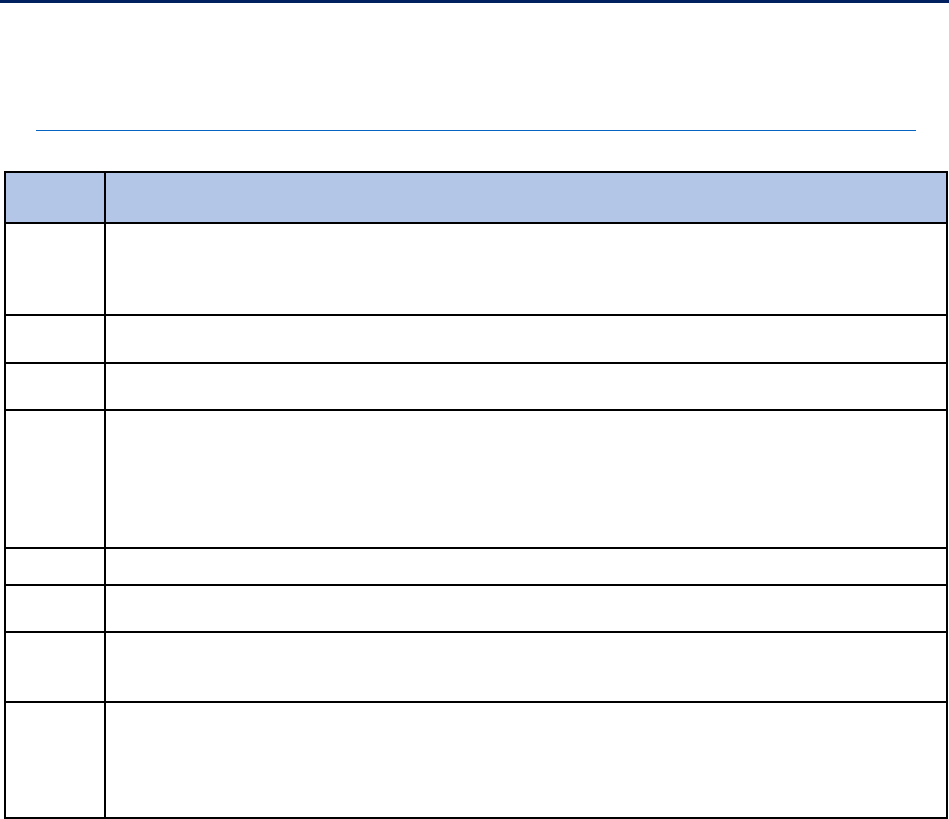
Page 23
Additional Actions Need to Be Taken to Identify and Address Noncompliant Biofuel Tax Credit Claims
Appendix III
Internal Revenue Code Sections Related to the Biofuel Tax Credit
I.R.C. §
Description
34
Provides a refundable income tax credit for the alternative fuel credit, biodiesel and renewable
diesel mixture credit, and sustainable aviation fuel credit in an amount equal to the sum of the
credit under I.R.C. § 6427(e). Credit is not allowed for any amount that was paid under I.R.C. §
6427.
40
Provides that a nonrefundable credit is claimed on the Form 6478, Biofuel Producer Credit, and
consists of the second generation biofuel producer credit.
40A
Provides a nonrefundable credit for biodiesel or renewable diesel that is sold for use as a fuel or
used as a fuel in the taxpayer’s trade or business.
4041
Imposes tax on any liquid other than gasoline that is sold by any person to an owner, lessee, or
other operator of a diesel-powered highway vehicle or train or used by any such person as a fuel
in a diesel-powered train. It also imposes tax on any liquid (other than gasoline) and compressed
natural gas that is sold by any person to an owner, lessee, or other operator of a motor vehicle or
motorboat for use as a fuel in such motor vehicle or motorboat or used by any person as a fuel in
a motor vehicle or motorboat.
4081
Tax is imposed on the sale or removal of blended taxable fuel by the blender thereof.
4101
Provides the IRS with the authority to require businesses to register with the IRS before engaging
in certain excise activities.
6426
Provides a credit against tax imposed by I.R.C. § 4081 for the alternative fuel mixture credit,
biodiesel and renewable diesel mixture credit, and sustainable aviation fuel credit. It also
provides a credit against tax imposed by I.R.C. § 4041 for the alternative fuel credit.
6427(e)
To the extent that the biodiesel or renewable diesel mixture credit or sustainable aviation fuel
mixture credit described in I.R.C. § 6426(c) and (k) exceeds a person’s I.R.C. § 4081 liability,
payment is allowable to the producer of the mixture. To the extent that the alternative fuel credit
described in I.R.C. § 6426(d) exceeds a person’s I.R.C. § 4041 liability for a quarter, payment is
allowable to the alternative fueler.
Source: SB/SE Division Biodiesel Help Guide and Excise Revenue Agent Basic Recruit Training – Phase 2
with revisions provided by the SB/SE Division.

Page 24
Additional Actions Need to Be Taken to Identify and Address Noncompliant Biofuel Tax Credit Claims
Appendix IV
Tax Forms Related to the Biofuel Tax Credit
Tax
Form
Description and Purpose
3800
General Business Credit
summarizes all of the various credits claimed and calculates the total
General Business Credit amount allowed in the current year.
4136
Credit for Federal Tax Paid on Fuels
claims biodiesel, renewable diesel, and alternative fuel
credits as refundable income tax credits on the taxpayer’s Federal income tax return when any
amount of biodiesel, renewable diesel, or alternative fuel have not been claimed on the Form
8849, Schedule 3, or Form 720, Schedule C.
637
Application for Registration (For Certain Excise Tax Activities)
registers a business with the IRS
before it engages in certain excise activities.
6478
Biofuel Producer Credit
claims the I.R.C. § 40 nonrefundable credit consisting of the second
generation biofuel producer credit.
720
Quarterly Federal Excise Tax Return
reports liability by IRS number, pays the excise taxes on the
form, and makes claims against the liability.
8864
Biodiesel and Renewable Diesel, or Sustainable Aviation Fuels Credit
claims the I.R.C. § 40A
nonrefundable credit for biodiesel and renewable diesel sold for use as a fuel or used as a fuel in
the taxpayer’s trade or business.
8849,
Sch. 3
Certain Fuel Mixtures and the Alternative Fuel Credit
requests a payment for the excess amount
of the credits in lieu of claiming the refundable income tax credit on a Federal income tax return.
Source: IRS.gov.

Page 25
Additional Actions Need to Be Taken to Identify and Address Noncompliant Biofuel Tax Credit Claims
Appendix V
Current Examination Initiatives Related to the Biofuel Tax Credit
Title
Description
Tracking
Code
Month/Year
Initiated
Biofuel Claims for
Credit Reference
Numbers 307, 388,
and 390
Addresses biofuel claims made on the Form 720, Schedule C,
or the Form 8849, Schedule 3. Created to address
compliance issues related to these types of excise tax claims.
These are selected based on certain criteria such as no
related income tax return filed or credit reference number
dissonance from the business name.
4220 May 2022
Biodiesel Blenders
Below the Rack
Position holders of disbursed nontaxable biodiesel blends,
who are also identified as a fuel wholesaler or retailer, should
be reporting tax on Form 720 sufficient for the volume of the
disbursed product. These cases are selected when the
estimated tax is $1,000 or more than the estimated liability.
6300
November
2009;
Revised in
March 2014
and
September
2017
Workload Return
System
Workload Return System provides a "snapshot view" of each
excise taxpayer's filings based on summary statistics for filed
Form 720; Form 8849, Schedule 3; Form 2290; and
Form 637 and the Anomaly Integration Model for Form 720
Returns score for Form 720 returns. This score reflects the
overall likelihood of an assessment based on prior audit
results.
The Workload Return System will be used to identify taxpayers
for examination based on ranking of filing habits, Anomaly
Integration Model scores, total tax reported, and total claim
amount. Fairness in case selection criteria will be used to
select the best case first.
6569 Initiated in
2005;
Chartered in
June 2014,
December
2017, and
May 2021
Form 637, M
Registrant Nonfilers
The "M" activity letter signifies a blender of gasoline, diesel
fuel (including a diesel-water fuel emulsion), or kerosene
producing a taxable fuel outside the bulk transfer/terminal
system, including blenders of alcohol fuel mixtures, alternative
fuel mixtures, biodiesel mixtures, and renewable diesel
mixtures.
"M" registrants should have a Form 720 filing requirement,
because the "M" activity letter signifies producing a taxable
fuel outside the bulk transfer/terminal system. The "M" 637
registrant list is compared to Form 720 filings to select
nonfilers.
6608 August 2020
Nontaxable Use
Claims for
Alternative Fuels
Identifies entities that file nontaxable use of alternative fuel
claims on the Form 720, Schedule C, and Form 8849,
Schedule 1. Generally, nontaxable use claims for alternative
fuels should not occur due to the excise tax on alternative
fuels not being imposed until the time of sale or use.
Therefore, it would be unlikely that a claim for refund of the
excise tax paid for the nontaxable use of alternative fuels
would be allowable. Analyst will run a query of all Form 8849
and Form 720, Schedule C nontaxable use of alternative fuel
claims.
6696 April 2022

Page 26
Additional Actions Need to Be Taken to Identify and Address Noncompliant Biofuel Tax Credit Claims
Title
Description
Tracking
Code
Month/Year
Initiated
Alternative Fuel
Mixture Credits for
Butane and
Gasoline Blends
The IRS outlined in Revenue Ruling 2018-2, butane is not an
alternative fuel listed under I.R.C. § 6426(d). Therefore,
butane and gasoline (or any other gasoline blendstock)
mixtures are not alternative fuel mixtures for purposes of the
alternative fuel mixture credit.
6763 May 2017
Alternative Fuels
and Alternative
Fuels Mixture
Credits
Identifies entities that may be underreporting or not reporting
Fuel Tax liability on Form 720 for abstracts corresponding to
the Credit Reference Number of fuel credits claimed on
Form 8849, Schedule 3, or Form 720, Schedule C. Alternative
fuel and alternative fuel mixture credit gallons are compared
to the corresponding Form 720 fuel abstract gallons.
6771 November
2010,
Updated:
September
2017 and
August 2020
Propane and
Butane Mixture
Claims
Monitors cases involving claims for propane and butane
mixes.
6774 March 2018
Tax Year 2018
Form 1040 Excise
Referral Returns
Compliance
Initiative Project
Identifies potential areas of noncompliance with excise fuel
credits through data analysis. There is currently no specific
excise tax fuel credit initiative within the SB/SE Division Excise
Tax Program or SB/SE Division Income Tax Examination to
address fuel credits filed with income tax returns. These
examinations are focused on individual taxpayers.
7635 September
2020
Volume Comparison
720-TO vs. 720
Identifies entities that may be underreporting or not reporting
fuel taxes imposed on disbursements from terminals. This
initiative may also identify terminals that have incorrectly
reported information on Form 720-TO. Leads are identified by
comparing the volume of taxable fuel products disbursed from
terminals (per Form 720-TO) for each position holder versus
their corresponding Form 720. Consideration is given to
Form 720-TO reporting errors, e.g., related entity should have
been listed as the position holder. The remaining nonfilers
and underreporters are selected. Referrals are made for
Form 720-TO reporting errors.
7663 March 2009,
Updated:
June 2010,
November
2013,
January
2017,
September
2017, and
August 2020
Biodiesel Blenders
Below the Rack -
Claims
Claim anomalies are generated if the total tax-reported gallons
on the Form 720 are lower than the total amount of biodiesel
gallons claimed on the Form 720 or on the Form 8849,
Schedule 3, during a given calendar quarter. If the shortfall is
greater than $1,000 in any calendar quarter, the lead is
output.
7721 November
2009,
Updated:
March 2014
and
September
2017
Biofuel Claims vs
EPA RIN Data
Identifies leads when the gallons claimed on Form 720,
Schedule C, and Form 8849, Schedule 3, are more than the
RIN activity of fuel generated. Further investigation is
necessary to determine if the biodiesel or renewable diesel
claim is potentially overstated.
8398 December
2021
Retroactive Fuel
Claims
Identifies noncompliance on one-time claims for credits and
payments allowable under I.R.C.§§ 6426(c), 6426(d), and
6427(e) for biodiesel mixtures and alternative fuels sold or
used.
9971 March 2016,
Updated:
October 2017
and
August 2020
Fuel Summit Project Excise led compliance project that developed strategies that
are used by the fuel summit tracking code.
9973 May 2020
Source: SB/SE Division.

Page 28
Additional Actions Need to Be Taken to Identify and Address Noncompliant Biofuel Tax Credit Claims

Page 29
Additional Actions Need to Be Taken to Identify and Address Noncompliant Biofuel Tax Credit Claims
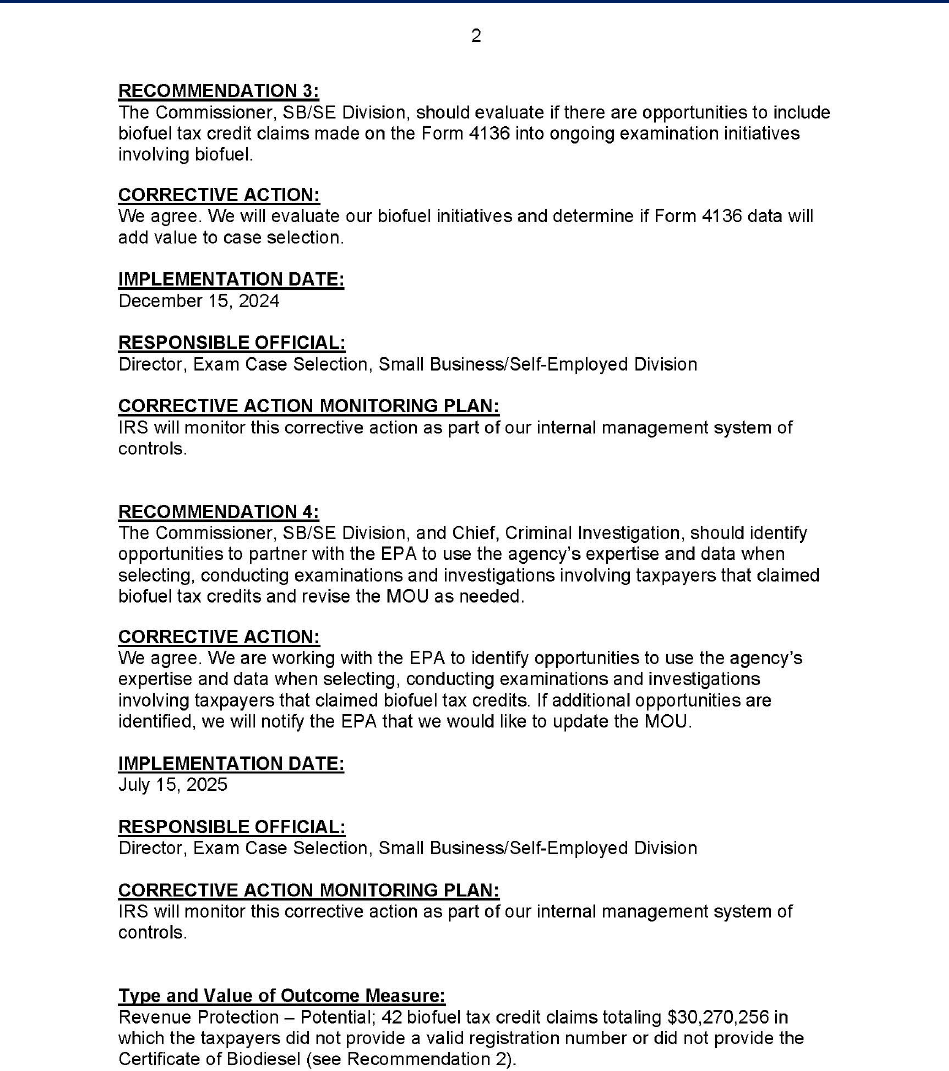
Page 30
Additional Actions Need to Be Taken to Identify and Address Noncompliant Biofuel Tax Credit Claims

Page 31
Additional Actions Need to Be Taken to Identify and Address Noncompliant Biofuel Tax Credit Claims

Page 32
Additional Actions Need to Be Taken to Identify and Address Noncompliant Biofuel Tax Credit Claims
Appendix VII
Glossary of Terms
Term Definition
Agri-biodiesel Biodiesel derived solely from virgin oils, and animal fats.
Campus
The data processing arm of the IRS. The campuses process paper and electronic
submissions, correct errors, and forward data to the Computing Centers for
analysis and posting to taxpayer accounts.
Employee User
Portal
Internal IRS portal that allows IRS employee users to access data systems, such as
tax administration processing systems, financial information systems, and other
data and applications, including mission-critical applications. TIGTA auditors can
also request access to this information.
Environmental
Protection Agency
(EPA)
A Federal agency with the mission to protect human health and the environment.
The EPA develops and implements policies and regulations to reduce air pollution
and emissions from mobile sources and the fuels that power them, including
advancing clean fuels and technology. In this role, the EPA collects data from
regulated parties on gasoline, diesel, renewable fuels, and other transportation
fuels to assess program implementation and compliance with fuels standards and
regulations.
Excise Tax
Excise taxes are levied on a variety of goods, services, and activities. The tax may
be imposed at the time of sale (by the manufacturer or retailer) or use (by the
consumer). Excise taxes are independent of income taxes.
1
Fiscal Year
Any yearly accounting period, regardless of its relationship to a calendar year. The
Federal Government’s fiscal year begins on October 1 and ends on September 30.
Internal Revenue
Code
The body of law that codifies all Federal tax laws. These laws constitute Title 26 of
the United States Code, which is a consolidation and codification by subject matter
of the general and permanent laws of the United States.
Internal Revenue
Manual
Primary source of instructions to employees relating to the administration and
operation of the IRS. It contains the directions employees need to carry out their
operational responsibilities.
Large, Unusual, or
Questionable Issues
Items that include income, deductions, balance sheet, and credit items. Issues that
appear on the return, which if left unexplained, might raise doubt or cause
confusion to a reviewer of the closed examination.
Modernized Tax
Return Database
The official repository of all electronic returns processed through the Modernized
e-file system.
Nationally
Coordinated
Investigations Unit
Formed by IRS Criminal Investigation during Calendar Year 2017 to partner with
internal and external stakeholders using a data-driven approach to deliver
high-impact investigations and address emerging threats to advance CI’s mission.
No-Change Rate A no-change is where all examined issues are accepted as reported.
1
Internal Revenue Manual,
Excise Taxes- General Information
, 4.24.1.3 (Mar. 17, 2023).

Page 33
Additional Actions Need to Be Taken to Identify and Address Noncompliant Biofuel Tax Credit Claims
Term Definition
Statistics of Income
Division
Collects, analyzes, and disseminates information on Federal taxation for the
Department of the Treasury’s Office of Tax Analysis, congressional committees, IRS
business units in its administration of the tax laws, other organizations engaged in
economic and financial analysis, and for the general public.
Submission
Processing Function
The data processing arm of the IRS that processes paper and electronic
submissions, corrects errors, and forwards data to the Computing Centers for
analysis and posting to taxpayer accounts.
Tax Year The 12-month period for which tax is calculated.

Page 34
Additional Actions Need to Be Taken to Identify and Address Noncompliant Biofuel Tax Credit Claims
Appendix VIII
Abbreviations
CI Criminal Investigation
ECS Excise Case Selection
EPA Environmental Protection Agency
IDRS Integrated Data Retrieval System
IRA Inflation Reduction Act
I.R.C. Internal Revenue Code
IRS Internal Revenue Service
MOU Memorandum of Understanding
RFS Renewable Fuel Standard
RIN Renewable Identification Number
SB/SE Small Business/Self-Employed
TIGTA Treasury Inspector General for Tax Administration
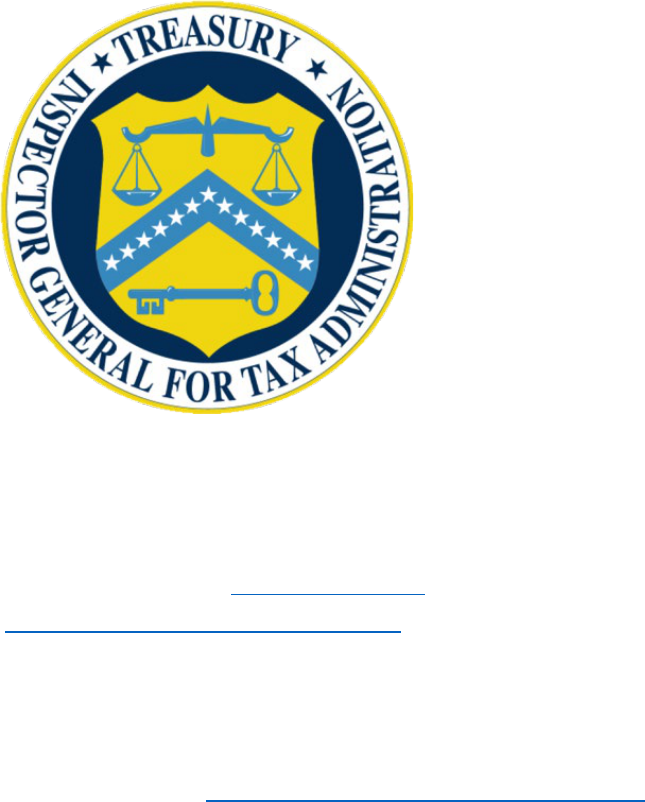
Page 35
To report fraud, waste, or abuse,
contact our hotline on the web at www.tigta.gov
or via e-mail at
oi.govreports@tigta.treas.gov.
To make suggestions to improve IRS policies, processes, or systems
affecting taxpayers, contact us at www.tigta.gov/form/suggestions
.
Information you provide is confidential, and you may remain anonymous.

